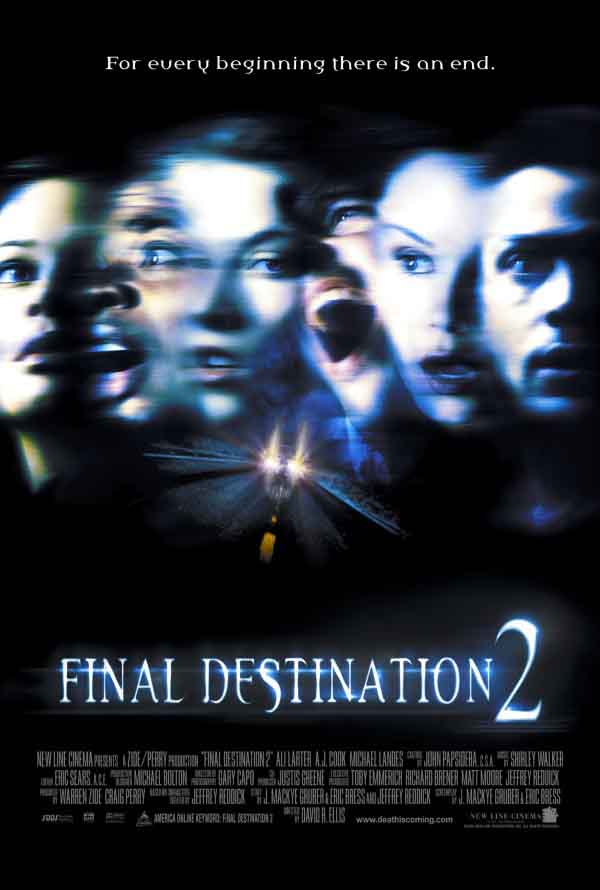Horror movies, like death metal songs, take one or more basic forms derived from the experience being described which symbolizes a psychological state in the user. Much like childhood night terrors, one form of horror movie is the pursuit themed movie. Final Destination 2 offers a new take on this which expands it into almost postmodern territory: death itself pursues a cast of characters and, because death is metaphysical but can influence the physical world, they find themselves pursued to paranoia because there is no tangible enemy to avoid or beat.
The plot of the Final Destination series stays invariant in its approach: an event which will bring death to a group of people is destined to occur, one of these people has a premonition, and the group avoids death, only to find that it has not forgotten them and like an engineer checking items off a “to do” list, comes after them invisibly and craftily. Death stalks its victims through a variety of Rube Goldberg contraptions made from everyday objects seeming to conspire toward evil ends, which is what makes this movie so fun. No situation is innocent because ordinarily innocent surroundings can, when twisted by the brilliant hand of doom, become fatal for the relatively ordinary and normally blithe people in these films.
Like the characters in the movie, the audience is driven to paranoia because these events have a conspiratorial nature. As the old saying goes, the whole is greater than the sum of the parts, and when small parts are combined with fiendish intelligence, they make death traps that could hide behind any door and every life event. This raises terror to a new level, because instead of characters approaching a known evil, the threat to their lives hides among the ordinary, and life must go on, so they try to survive with as much normalcy as possible despite feeling the breath of death on their necks at every moment. For a death metal fan, this resembles life itself, as “only death is real” and we are aware of the fragility of life, and banish superstition not only with cartoon fantasy visions of the afterlife but with the religious way that people view human life as being independent of nature, chance and anything beyond what we intend, as mediated by careers, commerce and laws.
Perhaps the most telling moment of the underlying thematic material in this film becoming clear involves a character who, having seen another character terminated in gory excess, goes on a lengthy neurotic breakdown rant in which he screams repeatedly, as if trying to convince himself more than others, “I control my life.” Other characters launch into worlds of human construction to hide from death: one talks about her career, another immerses himself in drugs, and another in mourning and self-pity. All come to doom except the few who manage to be both realist and focus on survival, and become aware of the metaphysical and take the threat seriously even though they do not understand it. Final Destination 2 effectively parrots back to modern people (in a more interesting form) the existential terror of death in the anonymous city where at any minute our technology and social order can collapse and leave a trail of victims.
The original Final Destination focused on a plane crash but the second in the series works with the more mundane threats to the modern citizen, which in a way are more terrifying despite the constant mysterious disappearance, shooting down and crashes of planes that have become a staple of the news of late. In this film, death lurks everywhere and a plan exists for each of us determining when we die. This offends our post-Enlightenment sense of being masters of our own fate and wiser than nature, because in this case death acts more like a force of nature than a ghost or spirit, making it terrifying, systematic and relentless.
Knowing the horror genre well, apparently, the filmmakers do not fail to follow the pattern of horror films, which is that characters struggle against their own denial before they encounter a supernatural force, and then only those willing to both believe in it as real and learn about it to fight it on its own terms can prevail. This formula proves effective because it is a metaphor (for Ara) for our own process of learning in life, where our assumptions prove insufficient and we must recognize the failure, drop our pretense of control, and then learn about what we oppose in order to get past it. Tightly scripted and edited, this film keeps suspense high but not uniformly so, creating a graceful story arc which accelerates rapidly before its peak, delivering all of the thrills and wisdom of a horror film in a compact package.
7 CommentsTags: a.j. cook, a.j. cook's boobs, ali larter, final destination, horror film, michael landes


